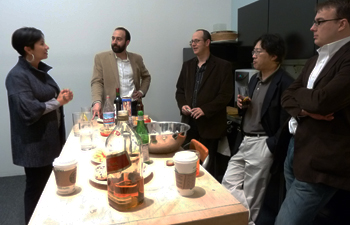
The debate around online privacy has largely centered around advertising that is targeted at people depending on where they have been online. While somewhat creepy, those ads are perhaps the least of our worries. What many of us don’t realize is that there are multiple parties tracking our moves online, some harmless and some possibly nefarious.
In fact, one of our MediaShift readers pointed out that PBS.org itself has at least seven trackers on its site:
I found that on the PBS.org site there are 7 trackers active, they are AddtoAny, Comscore Beacon, Disqus, DoubleClick, Foresee, Google AdSense, and Google Analytics…I found these because I use a Firefox add-on called ‘Ghostery’ that blocks trackers.
While the FTC considers a “Do Not Track” database, and Rep. Jackie Speier (D-Calif.) plans to introduce a “Do Not Track Me Online 2011” bill tomorrow in Congress, the debate about who can track us where online is heating up. The idea for such a database would be that consumers could opt-out in one simple way from all tracking online, similar to the “Do Not Call” database for telemarketers. But online, things aren’t so simple. Some tracking is for analytics, some is to help tailor a site to your preferences, and some to target ads. We convened a group of privacy experts, journalists and publishers to discuss — and debate — the limits to what companies and government could track about us online. Check it out!
5Across: Online Privacy
Guest Biographies
Ryan Calo runs the Consumer Privacy Project at the Stanford Center for Internet and Society. A graduate of Dartmouth College and Michigan Law School, Calo clerked on the U.S. Court of Appeals for the Sixth Circuit and practiced privacy and telecommunications law at Covington & Burling LLP before joining Stanford Law School in 2008. Calo works on the intersection of law and technology, including privacy and robotics. His work been covered by the New York Times, Wall Street Journal, and other major news outlets.
Declan McCullagh is the chief political correspondent for CNET and runs the Privacy Inc. blog there. Previously he was a senior correspondent for CBS News’ website and Washington bureau chief for Wired. He is a private pilot and lives on the San Francisco peninsula with his wife and 15-month old son.
Joanne McNabb is chief of the California Office of Privacy Protection, and is a Certified Information Privacy Professional and co-chair of the International Association of Privacy Professionals’ Government Working Group. She serves on the Privacy Advisory Committee to the U.S. Department of Homeland Security and is a Fellow of the Ponemon Institute. Before starting the Office of Privacy Protection, McNabb worked in public affairs and marketing, in both the public and private sectors, including five years with an international marketing company in France. She attended Occidental College and holds a master’s degree in Medieval Literature from the University of California, Davis.
Lee Tien is a senior staff attorney at the Electronic Frontier Foundation, a non-profit public interest group focusing on online civil liberties. He went to college at Stanford and law school at UC-Berkeley. He works on a wide range of privacy and security issues including electronic surveillance, cybersecurity, online tracking, national ID systems, location tracking, electronic health records, and the smart energy grid.
Anne Toth is the Chief Trust Officer for Yahoo, where she has managed a wide array of policy issues related to privacy, community, user-generated content, child safety, advertising standards, online accessibility, mobile products, and consumer direct marketing. Toth has been active in leading industry trade association efforts around interest-based advertising, serves on the board of directors of the Network Advertising Initiative and Future of Privacy Forum Advisory Board. She has testified before Congress in DC and the Article 29 Working Party in Brussels on matters related to online privacy. Prior to joining Yahoo, Toth was a research economist at the Fremont Group, a San Francisco-based private investment company affiliated with Bechtel.
If you’d prefer to watch sections of the show rather than the entire show, I’ve broken them down by topic below.
Where’s the Harm?
The ‘Do Not Track’ Debate
Big Brother is Watching
Differing Takes on Privacy
Free Speech vs. Privacy
Credits
Mark Glaser, executive producer and host
Corbin Hiar, research assistant
Charlotte Buchen, camera
Serene Fang, audio
Location: Vega Project & Kennerly Architecture office space in San Francisco
Special thanks to: PBS and the Knight Foundation
Music by AJ the DJ
*****
What do you think? Do you like the idea of a “Do Not Track” database? How much do you worry about your privacy while going online? Share your thoughts in the comments below.
Mark Glaser is executive editor of MediaShift and Idea Lab. He also writes the bi-weekly OPA Intelligence Report email newsletter for the Online Publishers Association. He lives in San Francisco with his son Julian. You can follow him on Twitter @mediatwit.

